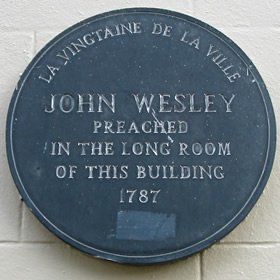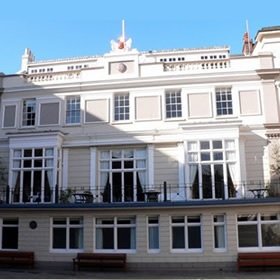

Methodism reached Jersey in 1774 via two Jersey fisherman, Pierre Le Sueur and Jean Tentin.
They were converted by a Methodist preacher, Laurence Coughlan, in Newfoundland, Canada, where they were cod fishing. (A memorial to the Jersey cod-fishers of the Gaspé peninsula can be seen on the quayside at St Aubin).
Methodist soldiers stationed with the English-speaking Regiment on Jersey, joined with these new converts and their families to form the first Society. John Wesley sent Robert Carr Brackenbury, squire of Raithby, Lincolnshire to them in 1783 as the first Methodist missionary to the Channel Islands (see Raithby chapel). The Rev Dr Thomas Coke soon followed.
Among Brackenbury's early converts was Jean de Quetteville, a young Jerseyman who had previously encountered Methodist preaching while completing his education in Winchester. He became a preacher, and Brackenbury and Coke persuaded him to embark on mission in Guernsey.
John Wesley himself did eventually make it to Guernsey in August 1787 (although he was forced by the weather to put into Alderney en route). His preaching places included Mon Plaisir, St Jacques (the home of Henri de Jersey, one of the Guernsey families influenced by the new faith) and the Assembly Rooms in St Peter Port (now the Guille-Allès Library).
Wesley was also received by the Governor - twice - being by then a national 'celebrity'. Wesley arrived in Jersey on 20 August 1787:
"About eleven we landed at St Heliers, and went straight to Mr Brackenbury's house. .I preached in the evening to an exceeding serious congregation, on Mark iii, and almost as many were present at five in the morning; whom I exhorted to go on to perfection; which many of them, Mr Clarke informs me, are earnestly endeavouring to do."
Wesley spent the next ten days preaching in various places in Jersey including the Long Room of the United Club in St Helier. One of his key problems with preaching in the Islands was his lack of French. He records for 23 August 1787:
"I rode to [Le Marais] St Mary's.. None at the house could speak English.. Mr Brackenbury interpreted sentence by sentence; and God owned His word.."
Methodism did not spread unchallenged however, and persecution was common with personal attacks and vandalism of property. Conscientious objection to undertaking militia drill on the Sabbath also led to penalties, until King George III intervened for the Methodist Islanders' beliefs to be respected.
In Jersey, the Methodists first renovated an old Catholic church, but later split into French and English speaking circuits and altogether built 42 chapels, 1790-1912.
The first Methodist chapel in Guernsey was opened by the French-speaking community in 1789 at St Peter Port. By the 20th century, there were 32 Methodist chapels on Guernsey - 7% of the population declared themselves to be Methodists in the 1911 census.
The Methodist community in all the Channel Islands was impacted by the German invasion during the Second World War - including being caught up in the deportation of civilians from Sark (vividly recalled in Nellie Le Feuvre's memoir A Sark Teenager's Deportation).
Across the Islands, some people stayed to face fear and privations, others were evacuated to mainland Britain, where many found themselves in financial hardship and homesick, separated from the Islands for five years.
However, the Islands' Methodist churches were allowed to continue to worship, although buildings such as Sunday Schools might be commandeered.
Local chapel histories from across the Islands include both harrowing and heart-warming accounts of life during the Occupation. David Chapman (a Methodist minister) has produced an excellent account of Channel Islands Methodism during the Second World War, Chapel and Swastika (ELSP, St Helier 2009).
Jersey & Guernsey